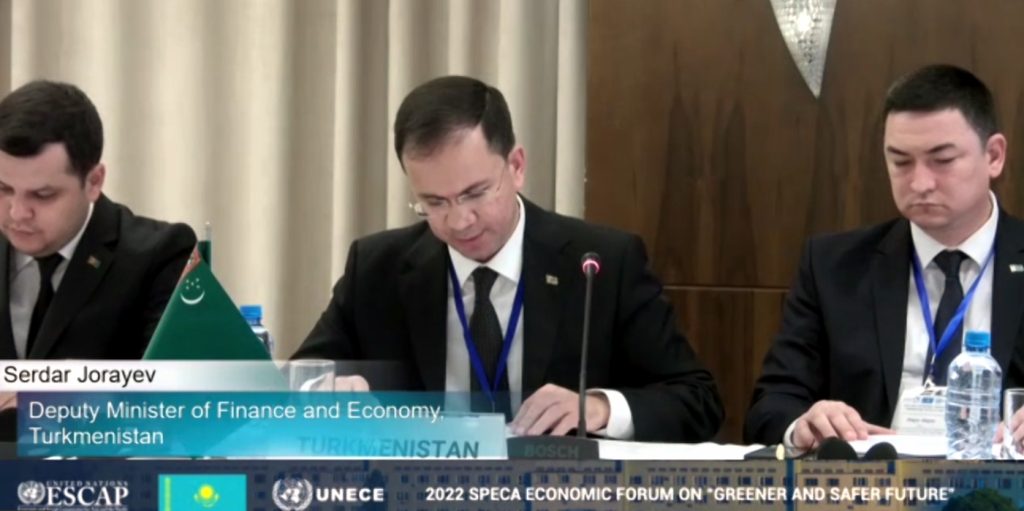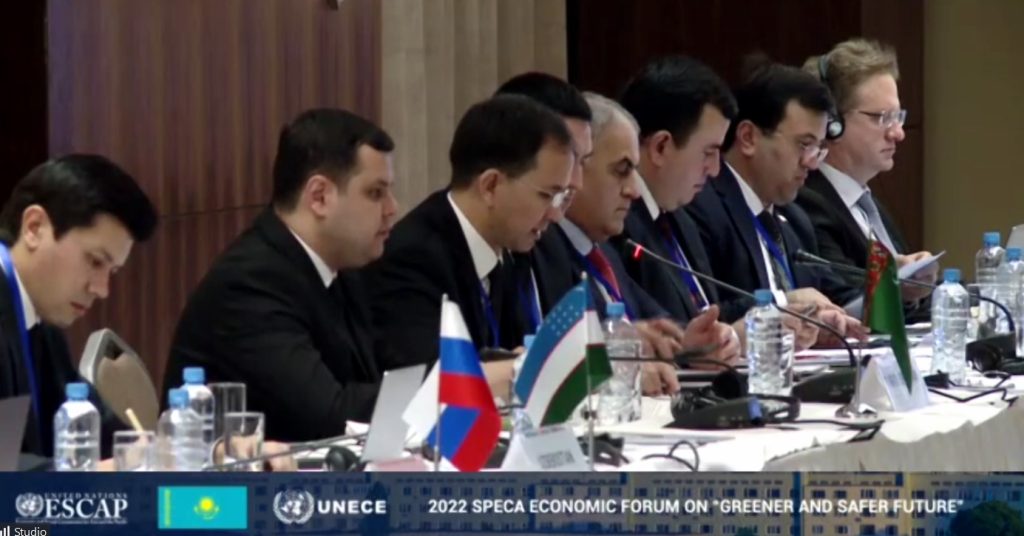Elvira Kadyrova
“Our nations have a high potential for comprehensive cooperation and mutual interaсtion is very important for us. For Turkmenistan, environmental protection and environmental issues are of paramount importance and are a priority. These issues have acquired particular importance within the framework of the implementation of the SDGs and the elimination of the consequences associated with the pandemic,” Deputy Minister of Economy and Finance of Turkmenistan Serdar Jorayev said during his remarks at the first session of the SPECA Economic Forum 2022 in Almaty, Kazakhstan.
Turkmenistan has ratified a number of major environmental conventions, signed the Paris Agreement on Climate Change, and is constantly working to solve emerging environmental problems.
Joraev also pointed out the fact that all national development programs for the medium and long term include issues of enhancing the processes of nature protection management, rational use of resources, and the development of the country’s economy taking into account clean development mechanisms.
At the international level, Turkmenistan’s national climate change strategy is the main tool for determining its position in negotiations under the UN Framework Convention on Climate Change, as well as a basic document for reporting on the implementation of its obligations under global climate treaties, he said.
The head of the Turkmen delegation listed the ongoing priority tasks within the framework of the national climate change strategy, including:
- Improvement of hydrometeorological observations of weather and climate change on the territory of Turkmenistan
- Development and implementation of mitigation and adaptation measures to climate change
- Implementation of measures for the economy of fuel and energy resources and stabilization of greenhouse gas emissions until 2030 through the use of energy-efficient and resource-saving technologies
- Increasing the level of international cooperation in the field of climate change measures
Speaking about practical measures to maintain environmental well-being in the country, the Deputy Minister of Economy and Finance of Turkmenistan said that work is underway in the country to create forest park zones, an inventory of all forests is being carried out, measures are being implemented to restore degraded forests in arid zones.
“In 2020 alone, 25 million tree seedlings were planted in the country, in 2021 – 30 million, and annually at least 3 million seedlings have been planted,” Joraev stressed.
In addition, Turkmenistan, supporting the efforts of the international community to reduce greenhouse gas emissions, is switching to the use of environmentally friendly resource-saving technologies in industry and transport. This is especially true for the oil and gas and energy industries.
“Turkmenistan adheres to the long-term global goal of not exceeding the 2- Celsius degree increase in the average global temperature by 2050,” the representative of the country noted.
Being a country with a sensitive arid ecosystem, Turkmenistan pays special attention to the issues of sustainable use of land resources, and being a party to the UN Convention on Desertification, takes measures to preserve the unique landscapes, flora and fauna of the desert.
In his speech, Jorayev also mentioned the implementation of a unique project of the Altyn Asyr Lake hydrotechnical complex, through which Turkmenistan solves the problem of degradation of agricultural and pasture lands, which is one of the key problems throughout Central Asia.
Turkmenistan is also actively participating in the program to improve the environmental and socio-economic situation in the Aral Sea basin and the National Program for the Aral Sea for 2021-2025 contributes to improving the agreement framework of the International Fund for Saving the Aral Sea, Jorayev recalled.
At the conclusion of his speech, the Turkmen side called on the SPECA states to join efforts and continue implementing best practices in order to cope with the challenges of the global Covid-19 pandemic and achieve the goals of green development.
***
The first session of the SPECA Forum “High-level Political Dialogue on a Greener and Safer Future in the SPECA Region” was devoted to discussing strategies for regional cooperation to support the construction of a greener and safer future.
During this session, the heads of delegations of the SPECA member countries shared their views on water resources, climate change, and other environmental and social issues.
Key findings of the High-level Political Dialogue:
- Green economy both as a strategic prospective and as a set of practical policy measures is already very high on the agenda of SPECA participants.
- All SPECA countries recognize that taking into account the facts of climate change will be a priority for government actions in the future. Not only because it is a global commitment made in Glasgow, but also because climate change poses a real risk to the region.
- One topic, that was very common for all presentations, was the preserving the region’s fragile environment, its forests, glaciers and simultaneously preservice the air quality and water availability.
- The region should immediately take measures to improve energy efficiency and energy intensity on an industrial and household scale.
- The SPECA countries should pay much more attention to renewable energy sources and the greening of the energy balance.
///nCa, 16 November 2022

